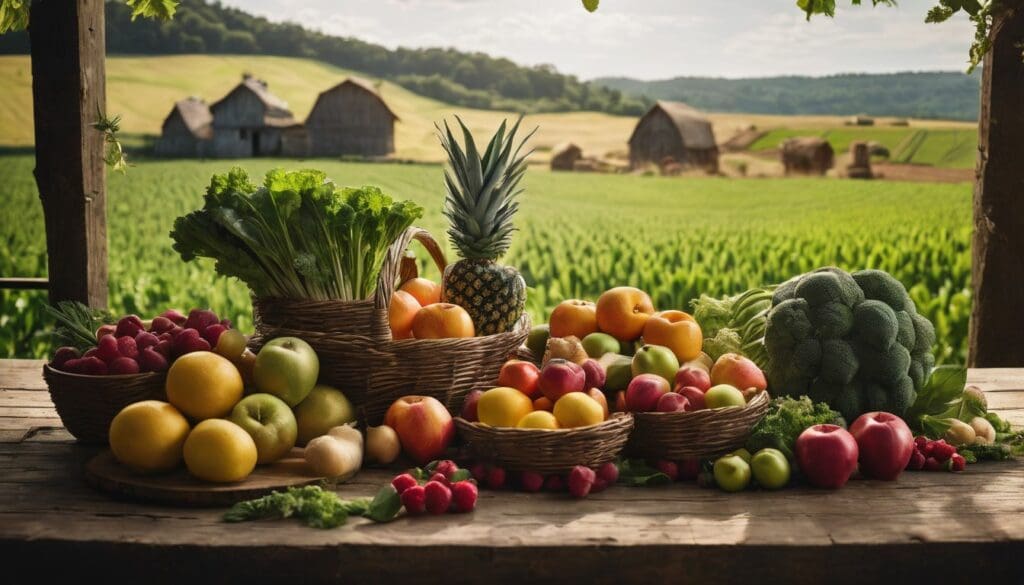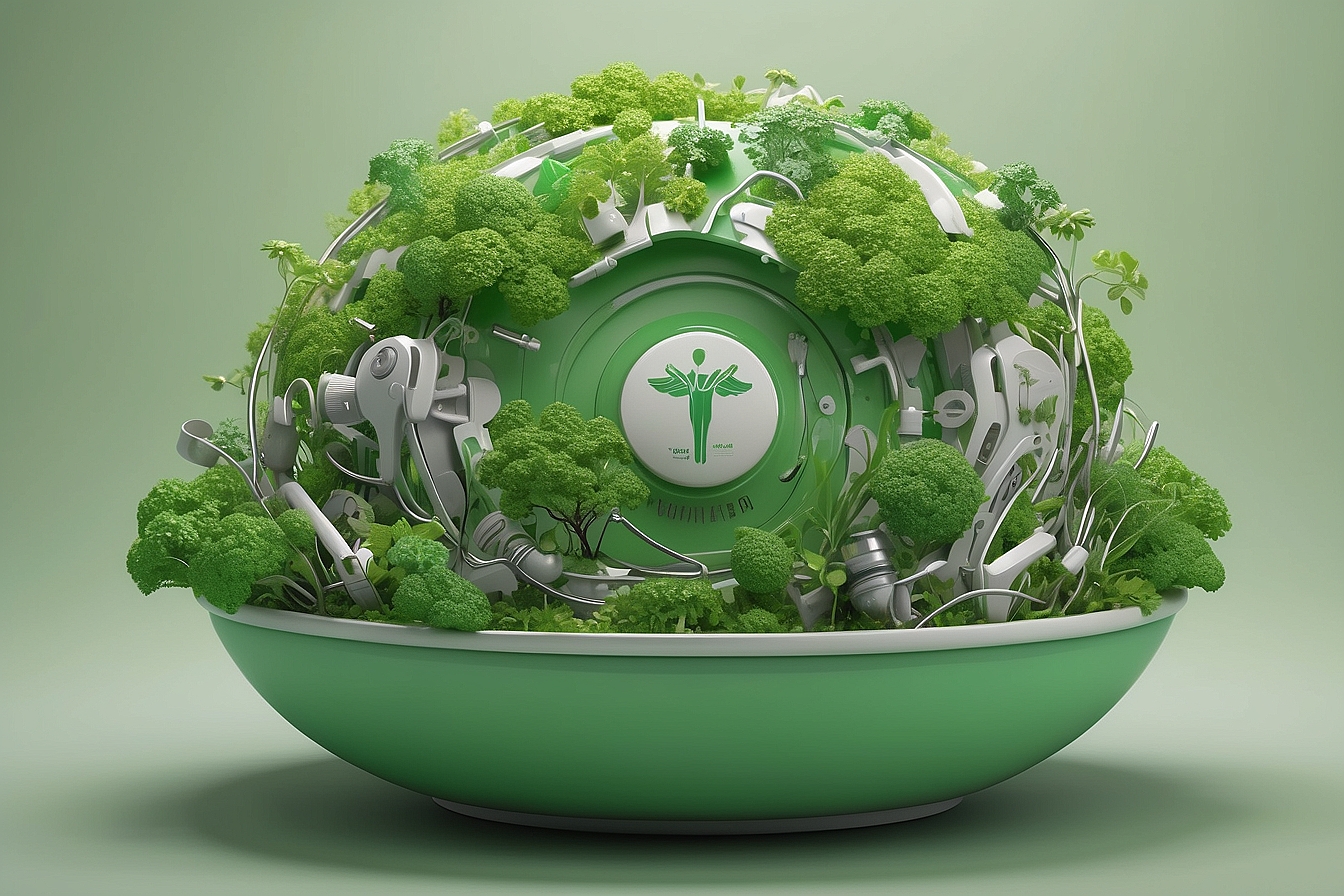Choosing between organic and conventional foods can often be a bit of a puzzle, leaving us in a bit of a muddle as we ponder over which choice might be the better one for our health.
If you’re anything like me, you’ve probably stood in the supermarket aisles with furrowed brows, trying to make sense of all the labels vying for your attention. But fear not; I’ve dedicated quite some time to peeling back the layers on what ‘organic’ really stands for – both for our wellbeing and our ethics.
Journey with us as we unravel this conundrum together – it’s far less complicated than it first appears!
Key Takeaways
- Organic foods are grown without synthetic pesticides, GMOs or artificial fertilisers, aiming for sustainability and environmental kindness.
- Consuming organic produce may lead to reduced exposure to harmful chemicals and higher antioxidant levels, though nutritional differences can be minimal when compared to conventional foods.
- The cost of organic foods is generally higher due to more labour – intensive farming practices and certification costs, but buying seasonal produce and prioritising certain items can help manage expenses.
- Pesticide residues in conventional agriculture raise health concerns, particularly for children who are more vulnerable to potential risks such as developmental delays and neurological problems.
- Opting for organic products supports sustainable farming methods that benefit soil health, water quality and overall conservation efforts.
Understanding Organic Foods
When we talk about organic foods, what exactly do we mean? Organic farming methods and the labeling of organic products are important aspects to consider when understanding the difference between organic and non-organic foods.
Definition of organic foods
Organic foods come from farming practices that strive to be sustainable and kind to the environment. They steer clear of synthetic chemicals like pesticides, artificial fertilisers, and genetically modified organisms (GMOs).
Instead, organic farmers use natural processes and materials to nurture their crops and livestock. This approach ensures the food on our tables is closer to what nature intended.
Every bite of organic produce meets strict government standards before it can wear the ‘organic’ label proudly. These benchmarks ensure everything from seed selection to harvesting aligns with eco-friendly principles.
As we select these items off shelves, we’re choosing products that support conservation efforts and contribute less to pollution. Organic farming also maintains healthy soil while protecting water quality, making every purchase a nod towards preserving our planet for future generations.
What it means for food to be organic
Organic food refers to produce and other ingredients grown without the use of synthetic pesticides, bioengineered genes (GMOs), petroleum-based fertilisers, or sewage sludge-based fertilisers.
It means that organic farmers rely on natural methods for controlling pests and promoting soil health. Organic livestock must have access to the outdoors and be given organic feed.
Furthermore, any processed foods are not allowed to contain artificial preservatives, colours or flavours.
Organic farming methods
Transitioning from understanding what it means for food to be organic, let’s dive into the world of organic farming methods. Organic farms prioritise sustainable practices such as crop rotation, composting, and natural pest control.
These methods aim to maintain soil fertility, promote biodiversity, and minimise synthetic inputs like pesticides and fertilisers. Farmers use techniques such as cover cropping and mulching to enhance soil health and water conservation.
Additionally, they avoid genetically modified organisms (GMOs) and focus on preserving the natural integrity of their agricultural produce.
Implementing these practices requires dedication and expertise but ultimately contributes to a healthier environment by reducing chemical pollution while supporting local ecosystems.
Labeling of organic products
When buying organic products, look for the official logo or certification from recognised organic standards bodies, such as the Soil Association or USDA Organic. This signifies that the product meets strict guidelines and has been produced without synthetic pesticides, artificial fertilisers, and genetically modified organisms (GMOs).
Additionally, read labels carefully to check for specific claims related to organic content. Words like “100% organic,” “organic,” or “made with organic ingredients” have distinct meanings in terms of the percentage of organic ingredients used.
Many consumers find it helpful to familiarise themselves with key certification logos and what they represent. This can aid in making informed decisions about which products align with individual values and preferences regarding sustainable food choices.
Cost Differences of Organic Foods
Organic foods are generally more expensive due to higher production costs and lower yields, but there are budget-conscious options available for those interested in making the switch.
To find out more about how you can incorporate organic foods into your diet without breaking the bank, continue reading.
Why organic foods are more expensive
Organic foods are more expensive due to the higher costs associated with organic farming methods. These methods include manual weed control, natural fertilisers, and organic pest control, which require more labour and time compared to conventional farming.
Additionally, the certification process for organic products adds to the overall expense. Despite the higher price tag, many environmentally conscious individuals prioritise purchasing organic foods because they support sustainable agricultural practices and believe in the health benefits of consuming pesticide-free produce.
Moreover, demand for organic food has been steadily increasing in recent years, leading to a surge in its production costs as well. This supply-demand dynamic further contributes to the higher cost of organic foods compared to conventionally grown items.
Considerations for budget-conscious consumers
Nutritional Value of Organic Foods
There is ongoing debate about whether organic foods are more nutritious, but some studies suggest that they may have higher levels of certain nutrients and antioxidants. To find out more about the potential health benefits of organic produce, keep reading!
Debate on whether organic foods are more nutritious
Many studies have debated whether organic foods are more nutritious. Research has shown mixed results, with some studies suggesting that organic produce contains higher levels of certain nutrients and antioxidants compared to conventionally grown produce.
However, other research indicates that the nutritional differences between organic and non-organic foods may be minimal. It’s important for environmentally conscious individuals to weigh the evidence carefully before making decisions about their food choices.
Consumers should consider various factors such as individual health needs, budget constraints, and environmental impacts when deciding whether to opt for organic foods over conventional ones.
Possible health benefits of organic produce
Organic produce may offer health benefits due to the absence of synthetic pesticides and fertilisers. Studies suggest that organic fruits and vegetables have higher levels of antioxidants, which can help protect cells from damage caused by free radicals.
Additionally, consuming organic meat and dairy products may reduce exposure to antibiotic-resistant bacteria and growth hormones. Furthermore, choosing organic foods supports sustainable farming practices, creating a positive impact on both personal health and the environment.
Consuming organic produce could potentially decrease pesticide exposure, minimise the risk of antibiotic resistance, improve antioxidant intake, and support sustainable agricultural methods.
Safety of Organic Foods
Concerns about the harmful effects of pesticides in conventionally grown produce and meat, as well as potential risks to children and adults. Read on to learn more about the safety of organic foods.
Concerns about pesticides in conventionally grown produce and meat
Pesticides are regularly used in conventional farming to protect crops from pests and diseases. These chemicals can leave residues on produce and meat, which has raised concerns about the potential health risks associated with consuming them.
Research suggests that pesticide residues may pose a risk to human health, particularly in children whose developing bodies may be more vulnerable.
Exposure to pesticides has been linked to various health issues, including neurological problems, hormone disruption, and even certain types of cancer. Therefore, it’s important for environmentally conscious individuals to consider the potential impact of pesticide residue when making food choices.
Potential risks and effects of pesticides on children and adults
After discussing concerns about pesticides in conventionally grown produce and meat, it’s essential to understand the potential risks and effects of these chemicals on both children and adults.
Pesticides have been linked to a range of health issues, including developmental delays, neurological problems, and certain types of cancer. Children are especially vulnerable due to their developing immune systems and smaller bodies, making them more susceptible to the adverse effects of pesticide exposure.
Additionally, exposure to pesticides has also been associated with fertility issues in adults, as well as an increased risk of certain chronic diseases like diabetes and cardiovascular conditions.
Making the Switch to Organic Foods
Incorporate more organic foods into your diet by starting with small changes, such as choosing organic fruits and vegetables or switching to organic dairy products. Read on to learn how these simple shifts can lead to a healthier lifestyle overall.
Tips for incorporating organic foods into your diet
- Explore local farmer’s markets or join a Community Supported Agriculture (CSA) programme to access fresh, organic produce directly from farmers.
- Opt for organic versions of the “Dirty Dozen” – a list of fruits and vegetables with the highest pesticide residues if budget constraints prevent switching entirely to organic produce.
- Consider growing your own organic herbs and vegetables in a small garden or containers at home, providing fresh ingredients for meals.
- Read labels carefully when choosing packaged foods, looking for certifications such as “USDA Organic” or “Soil Association Organic” to ensure they meet organic standards.
- Experiment with cooking techniques that highlight the natural flavours of organic ingredients without needing heavy seasoning or additives.
- Substitute conventional meat and dairy products with their organic counterparts to reduce exposure to antibiotics and synthetic hormones used in non-organic animal farming.
- Prioritise whole foods like grains, legumes, nuts, and seeds which are easier to find in organic varieties and retain more nutrients than processed alternatives.
Weighing the evidence and making a decision
After considering the factors such as cost, nutritional value, and safety of organic foods versus conventional options, it’s important to weigh the evidence in making a decision. Understanding the potential health benefits and risks associated with both types of food is crucial for informed decision-making.
Considering personal preferences, budget constraints, and environmental impact can also play a significant role in deciding whether to make the switch to organic foods.
Examining the evidence regarding pesticide residues, nutritional content, and long-term health effects can help individuals make an informed decision about incorporating organic foods into their diet.
Conclusion
In conclusion, the health benefits of organic foods are still under debate. Weighing the evidence and making an informed decision is crucial when considering a switch to organic foods.
The potential risks of pesticide residue in conventionally grown produce and meat should be taken into consideration. For environmentally conscious individuals, supporting conservation and environmental sustainability are key factors in choosing organic products over conventional ones.
FAQs
1. What makes organic foods different from conventional foods?
Organic foods are grown without synthetic pesticides and fertilisers, making them a natural and pesticide-free alternative to conventional food, which often contains these chemicals.
2. Are there more health benefits to eating organic foods?
Yes, organic food can have higher levels of antioxidants compared to nonorganic options and may reduce the exposure to harmful pesticide residues.
3. Can switching to organic foods help with my allergies?
Some people find that their allergies improve when they eat organic foods because they’re free from certain chemicals and GMOs that can trigger allergic reactions.
4. Why do organic foods usually cost more?
Organic farming practices are often more labor-intensive and have lower yields than conventional methods, hence the higher price tag for farm-to-table produce.
5. What are some disadvantages of eating organic food?
While packed with potential health benefits, one drawback is that you might face a limited selection since not all products come in an organic variant; plus, it could put a bigger dent in your wallet.





